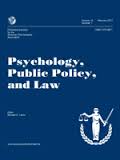 Perceptions of abuse history mitigate support for juvenile sex offender registration in the abstract, yet are viewed as aggravating factors when considering both severe and less severe specific cases. This is the bottom line of a recently published article in Psychology, Public Policy and Law. Below is a summary of the research and findings as well as a translation of this research into practice.
Perceptions of abuse history mitigate support for juvenile sex offender registration in the abstract, yet are viewed as aggravating factors when considering both severe and less severe specific cases. This is the bottom line of a recently published article in Psychology, Public Policy and Law. Below is a summary of the research and findings as well as a translation of this research into practice.
Featured Article | Psychology, Public Policy, and Law | 2015, Vol. 21, No. 1, 35-49.
The Influence of a Juvenile’s Abuse History on Support for Sex Offender Registration
Author
Margaret C. Stevenson, The University of Evansville
Cynthia J. Najdowski, University at Albany, State University of New York
Jessica M. Salerno, Arizona State University
Tisha R. A. Wiley, National Institute on Drug Abuse, Rockville, Maryland
Bette L. Bottoms, The University of Illinois at Chicago
Katlyn S. Farnum, The University of Nebraska
Abstract
We investigated whether and how a juvenile’s history of experiencing sexual abuse affects public perceptions of juvenile sex offenders in a series of 5 studies. When asked about juvenile sex offenders in an abstract manner (Studies 1 and 2), the more participants (community members and undergraduates) believed that a history of being sexually abused as a child causes later sexually abusive behavior, the less likely they were to support sex offender registration for juveniles. Yet when participants considered specific sexual offenses, a juvenile’s history of sexual abuse was not considered to be a mitigating factor. This was true when participants considered a severe sexual offense (forced rape; Study 3 and Study 4) and a case involving less severe sexual offenses (i.e., statutory rape), when a juvenile’s history of sexual abuse backfired and was used as an aggravating factor, increasing support for registering the offender (Study 3 and Study 5). Theoretical and practical implications of these results are discussed.
Keywords
Child sexual abuse, juvenile sex offending, legal decision making, attributions, public policy
Summary of the Research
The authors conducted 5 studies investigating public perception of juvenile sex offenders’ history of sexual abuse. Studies 1 and 2 examined “people’s estimates of the prevalence of sexual abuse among juvenile sex offenders, and whether they believe such abuse explains why juveniles commit sex offenses. This study also tested whether such beliefs would relate to decreased or increased support for applying registry laws to juvenile sex offenders” (p. 37). “In Study 3, [they] tested the extent to which beliefs that sexual abuse leads to sex offending influence registration support for juvenile sex offenders in specific cases (i.e., forced rape, statutory rape, harassment, and sexting)” (p. 40). “To conclude this with more certainty about causality, [they] conducted a direct experimental test to understand how a juvenile’s history of sexual abuse influences registration support in a forced rape case (Study 4) and separately in a statutory rape case (Study 5)” (p. 43).
“As expected, when asked about juvenile sex offenders generally, participants greatly overestimated the prevalence of a history of sexual abuse among juvenile sex offenders— both when asked to report their spontaneous thoughts about why juveniles commit sex offenses and when asked directly about sexual abuse. Further, the more participants attributed sex offending to past abuse, the less they supported policies that juveniles to register as sex offenders” (p. 45)
“Study 3 showed that public support for sex offender registration varies depending on whether individuals are asked about juveniles in general or about specific juveniles accused of different crimes ranging in severity. The more participants thought that a juvenile’s history of being sexually abused led him to perpetrate forced rape, the less supported registering the juvenile as a sex offender. These results support the idea that laypeople naturally think about heinous crimes when they are asked about sex offenders in general. In contrast, the more participants thought that a history of sexual abuse led juveniles to perpetrate less severe offenses (i.e., statutory rape, harassment, and sexting), the more they supported registering the juvenile as a sex offender. Although some studies have that child sexual abuse mitigates reactions toward juveniles accused of nonsexual offenses, our results suggest that people sometimes use beliefs about a history of sexual abuse as an aggravating factor when determining whether juveniles should register as sex offenders for committing less severe sex offenses” (p. 43).
“When a history of sexual abuse was experimentally manipulated, abuse history was consistently used as an aggravating factor in a less severe statutory rape case, and was ignored entirely in a severe forced rape case.
In conclusion, “abuse history mitigates support for juvenile sex offender registration. Yet, for nonprototypical, serious sex crimes, a different trend emerges, in large part due to the malleability of the perceived seriousness of the sexual offense—malleability that does not exist for extremely serious types of sexual offenses. Specifically, less severe sex crimes (i.e., statutory rape) are more likely to be perceived as true crimes when the juvenile has a history of sexual abuse and, in turn, participants use a juvenile’s sexual abuse history as evidence that he is permanently damaged, a danger to society, and deserving of registration.” (p. 46).
Translating Research into Practice
“Most people inaccurately assume juvenile sex offenders have been abused. Moreover, normative and consensual adolescent sexual activity is particularly criminalized when people assume that the adolescent is engaging in sexual activity because of his own history of abuse. Such findings have implications with respect to the fairness of registration policies, particularly because most juvenile sex offenders have not been sexually abused” (p. 46)
“To the extent that judges are allowed judicial discretion in applying registration policies to adolescents, the present research suggests that juvenile registration is likely to be applied capriciously and affect certain groups more than others” (p. 46)
“This research also has implications for sentencing. Sexual abuse history, presumed by the law to be a mitigating factor is at best frequently discounted, especially in severe cases, and at worst, even backfires in lenient cases, being used against juvenile sex offenders as an aggravating factor, as are other factors such as drug abuse, alcohol abuse, and child physical abuse. This finding is likely to be of interest to trial attorneys who must attempt to anticipate the factors that jurors will consider aggravating versus mitigating” (p. 46)
“Courts and policymakers should be encouraged to implement legal instructions and policies designed to encourage legal decision makers explicitly to be sensitive to a juvenile offender’s history of abuse, to educate them about the actual consequences of being abused, and to admonish them against using a history of abuse against a juvenile offender. It may be prudent for legal decision makers to provide rehabilitative resources and mental health services to juvenile sex offenders who commit these less severe offenses, particularly those with histories of child sexual abuse, instead of resorting to potentially harmful sex offender registration” (p. 46)
“Given that participants greatly overestimate the prevalence of a history of sexual abuse among juvenile sex offenders, and that this belief can lead to more severe treatment of juvenile sex offenders, another policy implication is to educate legal decision makers about actual prevalence rates of abuse histories among juvenile sex offenders. Policy-focused educators should take precautions when teaching this information and be careful to correct such mistakes in logic—mistakes that have the potential to result in discriminatory treatment of sexually abused juveniles” (p. 46)
Other Interesting Tidbits for Researchers and Clinicians
“Participants were more supportive of registering an abused versus a non-abused juvenile who committed statutory rape, even though they believed the abused juvenile was less able to control his behavior—an attribution that both the present and past research shows predicts leniency in case judgments. The present research demonstrates an interesting instance in which fear of recidivism (i.e., utilitarian goals of punishment) overrides the leniency that would otherwise be produced by uncontrollable attributions, and instead results in severe case judgments.” (p. 45)
“Abuse history predicted support for the full application of the registry, but not registration support. It is possible that the registration support variable triggers retributive goals of punishment because its wording refers to the severity of registration (i.e., “Public registration laws are too severe for juvenile sex offenders like David”). In contrast, the question assessing support for the full application of the registry does not require participants to consider the punitive severity of registration. Instead, participants are merely asked to recommend one of various registration options (i.e., no registration; registration, but without the juvenile’s information posted online; etc.) without making a value judgment about those options” (p. 45)
Join the Discussion
As always, please join the discussion below if you have thoughts or comments to add!























